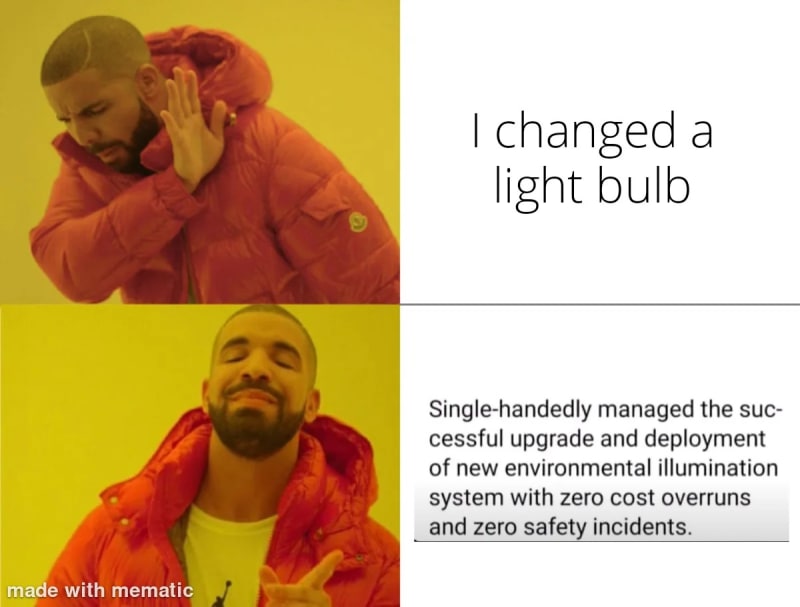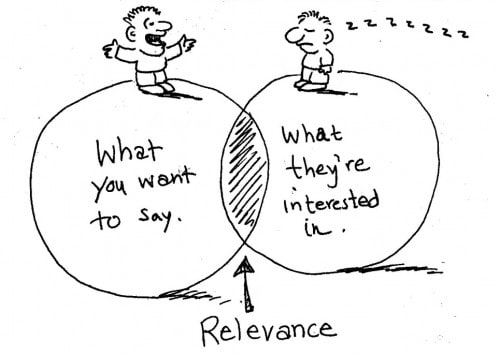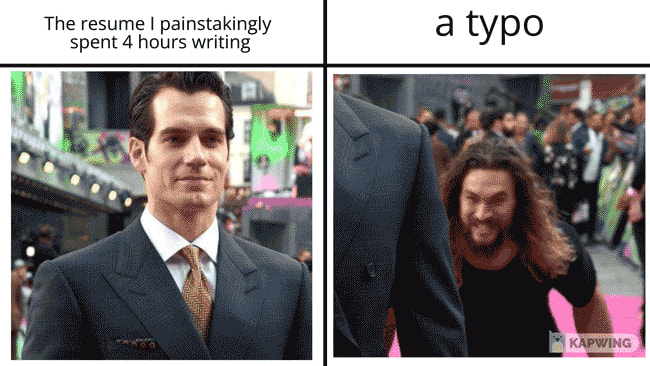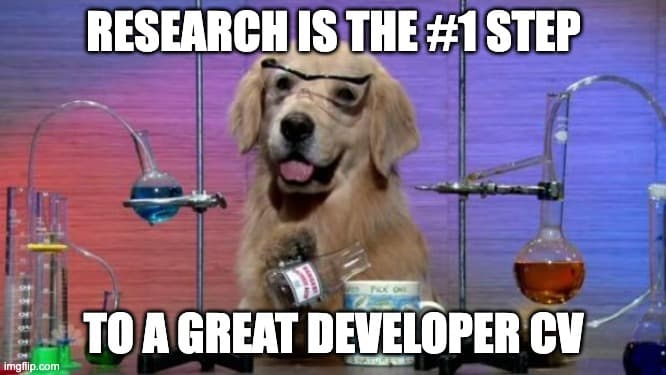Have you applied to 500+ developer jobs and got no answer?
And when they do, the interview feels like an FBI interrogation?
Digging deep into your past and rooting for you to fail?
Let me tell you a secret…
The problem is not that the job market is bad. The job market is what it is. And dozens of developers are signing new job contracts as you are reading this.
The problem is your developer CV.
With recession, remote work and layoffs being so common, the stakes are even higher because you are competing with hundreds of other developers every day.
If your developer CV doesn't stand out, you are out.
And the worst part?
If your CV is mediocre, you won’t even get a chance to practice your skills in a technical interview.
At the same time, most developer CV guides out there focus too much on superficial aspects of your CV that don’t make a difference. Formatting, letter types and all kinds of irrelevant details.
Or they tell you to directly use AI to write your CV…
Sure smart ass, but so does every other developer with a ChatGPT account. So forget about standing out. AI can help you go faster, but not stand out from the crowd.
 A great developer CV is a lot more than a list of buzzwords and job positions. It is a story of progression and growth. Read on to find out exactly how to craft one.
A great developer CV is a lot more than a list of buzzwords and job positions. It is a story of progression and growth. Read on to find out exactly how to craft one.
In this article, I will show you how to craft a developer CV that gets attention. With battle-tested tips that are proven to work in the real world.
I am not a guru, but I know what I am talking about. In the last three years I’ve written over 300+ developer CV’s. With many of them landing six figure jobs. And I did so overlooking every detail.
By the end of this article you will know exactly how to build a developer CV that will get you the job you are dreaming of. And allow you to live life on your own terms.
Let’s get going 🚀
Developer CV Building Principles
Before we dive into exact details on how to build a great developer CV, let’s make sure you understand the principles behind it.
Why principles?
Because, if you know the “Why” behind how we build your developer CV, you will be able to spot mistakes by yourself and make the right decisions without me looking over your shoulder.
Ignore these principles, and your CV will fall into the pile of thousands of other CVs that get ignored and tossed into the trash.
🚨 P.S. Are you looking to fast-track to the Senior level with quality resources, feedback, and accountability? Click here to join our Free Community - The Senior Dev Academy.🚨
Principle #1: Experience Is King.
In the current economy, companies only want to pay for developers who are proven to deliver. And what’s the best proof you can get the job done? The fact that you already did deliver in the past.
This is the most important tip you have to remember all along.
Our main goal is to look as experienced as we can so we can stand out and have a shot at the technical interview.
Some developers get uncomfortable here…
Are you telling me I need to lie in my CV? Nope. All I am telling you is to get whatever good parts you have there and oversell the hell out of them.
 Many tech jobs require unrealistic numbers of years of experience. If you are a Junior Developer this might scare you. Don’t worry we’ve all been there. You just have to put a bit more effort into your CV.
Many tech jobs require unrealistic numbers of years of experience. If you are a Junior Developer this might scare you. Don’t worry we’ve all been there. You just have to put a bit more effort into your CV.
If you have professional experience
Squeeze that as much as you can. Quantify everything you did, connect it with the company mission and focus on tangible achievements.
Is not about the code you wrote. Is about the problem you solved and how it made the company money. In a tough economy that’s all that matters.
If you do this right, your next job will be a much higher pay and a better title. Rather than more of the same crap.
If you don’t have professional experience
Well, if you are just starting out, it gets a bit harder. But not impossible. You will have to fabricate some experience. Here you need to be creative and flexible.
Back up that experience with a very solid story. This might push you out of your comfort zone, but if you want a job, you really have no choice.
For example, if you only have some side projects, instead of listing them, merge them all together in one position. Pick the top 2 side projects that you like the most. Deploy them to production and quantify what you built just like you would do it in a real job.
Same with courses, certifications, or whatever you are doing.
 The less experience you have, the more creative you will have to get in your CV. Read on to find how to do that without lying or making up stuff you have no idea about.
The less experience you have, the more creative you will have to get in your CV. Read on to find how to do that without lying or making up stuff you have no idea about.
Present it in a professional way!
If you are a fresh bootcamp graduate, add the Bootcamp experience as professional experience, and list yourself as a Trainee. Take it out of the education sector.
Senior Dev Tip: How many bullet points per job position should you have? When working with our mentees I recommend at least 5 to 7 bullet points for a position in the last 5 years(regardless of the duration of the job).
Principle #2: Show, Don’t Tell.
Nobody believes what you say. Unless it is backed by proof. Well, maybe except your mom or dad, but they won’t hire you anytime soon.
You claim you are proficient in React?
How many React-based applications have you been working on? What were some other technologies you used? What was their traffic/impact?
Every piece of code you’ve written should have a quantifiable impact attached to it. I know you are a developer and your work doesn’t directly produce dollar bills. But it does so indirectly.
Testing reduces defects, which reduces time to market, which saves money.
Monitoring and logging allow the company to deliver on their SLA (Service Level Agreement) which increases user satisfaction and trust.
Even soft skills are quantifiable. Aligning non-technical stakeholders on the capabilities of your current tech stack actually speeds up the development process.
Companies hire software developers for two reasons only.
To make more money by building new stuff. Or, to save money by making existing stuff more efficient.
If you want to stand out, everything you write in your developer CV should fall into one of these categories. And it should be quantified in such a way.
Senior Dev Tip: Some tech companies might hire developers so the competition can’t hire them (read Meta and friends), but with the recession around the corner, that practice is less and less common.
🚨 P.S. Are you looking to fast-track to the Senior level with quality resources, feedback, and accountability? Click here to join our Free Community - The Senior Dev Academy.🚨
Principle #3: Above All, Be Relevant.
You can have tens of years of experience. And you can quantify that experience in the most accurate way possible.
But, if it is not relevant for the position at hand, you won’t ever get called in for an interview.
Why? For the same reason why you don’t hire a brain surgeon for an investment banking position no matter how bright they are. Their skills are not relevant to the position.
The surgeon example might sound a bit extreme. In reality, relevance is not a binary criteria. The question is not, is your developer CV relevant to the position, but how relevant it is. It is a 5 over 10 or a 9 over 10. It better be a 10 over 10, but that’s not always possible.
Relevance is achieved first by research. Knowing exactly the kind of developer the companies you want to work for are looking to hire. And second by a change in mindset.
Despite everything you’ve been told, your developer CV is not an identical copy of your work experience.
It is only a snapshot of the work experience that is relevant to the job you are looking for. You cherry pick which part of your experience you want to showcase based on the market.
If your goal is a DevOps position, but you worked as fullstack before, you will want to pick whatever DevOps experience you have and talk mostly about that. Is a bit like politics I know, and developers hate politics.
To give your developer CV the best chance to stand out in this market, make sure it is as relevant as you can to the position you are applying for.
This does not mean you will write a new CV for each position you apply for. That will take too much time and energy. Read on to find out what to do instead.
Principle #4: Avoid Dumb Mistakes.
Now let’s talk about red flags. Those are things that no matter how great your developer CV is, will raise eyebrows and get you rejected.
They will bring in awkward questions and invite interviewers to dig deeper triggering their spider senses instead of giving them more confidence in the choice they are making.
Some of the most important are:
- Short work experiences
- Long employment gaps
- Random jobs
- Dates that don’t match
- Title that don’t make sense
- Typos
The most important mistakes here are typos and employment gaps.
For typos, make sure you use Grammarly.
For employment gaps, try to minimize them, by merging positions. If you freelanced for a different company every three months, merge those experiences into one.
Same with job titles and dates.
You want to merge those experiences. To tell a story of continuity and progression.
In reality there are going to be ups and downs, but the CV is not the place to reflect that. Your developer career should look like steady continuous progress towards a higher level.
If you did everything and you still have big gaps, make sure you have a good answer prepared as to why you have that gap in your CV. Good reasons can be things that pay into your personal development, like taking a sabbatical year to travel the world.
Senior Dev Tip: I advise you not to mention things like taking time between jobs to improve skills, even if very legit, it can make you look like a beginner.
🚨 P.S. Are you looking to fast-track to the Senior level with quality resources, feedback, and accountability? Click here to join our Free Community - The Senior Dev Academy.🚨
Principle #5: Simple Always Wins.
Don’t overthink about the design of the CV. No one will hire you based on the font you used. Or the pretty formatting. You are a software developer, not a designer.
Keep it simple. Just like the code you write.
You can clone the template I provide later in this article, or pick the most simple one from the ones you have at hand. Avoid fancy at all costs. It is not about how pretty the CV is, but about how easy to read it is.
Principle #6: Quality And Quantity At The Same Time.
You’ve heard the old saying “finding a developer job is a numbers game”. If you apply to a few hundreds of jobs you will eventually get one.
This is very bad advice, because it is exactly what every other developer is doing out there. Every Week some developer comes into a call with me telling me about the hundreds of CVs they are sending without any answer complaining about the market.
Most times, they never stopped to fix the CV. And when they did, they just added a bunch of buzzwords without any consideration.
In the current developer job market, quantity matters as much as quality. Before you start applying to hundreds of jobs, make sure your developer CV looks at it’s best possible.
Note on using ChatGPT or AI CV Builders
I advise you to use ChatGPT for a first draft and for brainstorming. But, you should edit everything that ChatGPT generates.
If not, your CV will look machine written and won’t stand out from all the other ChatGPT generated CVs. You will notice how GPT tends to repeat itself and use cheesy words (like starting every freakin’ sentence with “spearheaded”).
 Those ChatGPT generated CV’s be like. Image Credit: Reddit.
Those ChatGPT generated CV’s be like. Image Credit: Reddit.
Regarding AI CV builders, from what I’ve seen so far, they have nice UIs built on top of ChatGPT.
I personally don’t like most of their templates.They restrict your freedom and add a lot of unnecessary elements (fancy design, picture, etc)
You are better off if you stick to a good Google Docs template, and use GPT to help you with the first optimization of the draft.
Writing Your Top-Notch Developer CV
Now that you know the principles you need to follow, let’s move on to the not-so-easy part, that is actually writing your developer CV.
There are 3 phases to building a great developer CV:
- Research
- Writing
- Editing and Review
1. Research
Remember the “speak their language” principle? Your CV has to look like it’s been written for the job. At the same time, we don’t want to build a different CV for every job. That would be a major time sink.
The best is to follow the Pareto principle (80%, 20%). Your CV should match 80% of the job position requirements in terms of technologies and frameworks.
How do you find the 80%?
You research.
Use both Google and LinkedIn to look at positions you think could be a fit. Save the job requirements in a document. Do this for 15 to 20 positions. Now take a look at keywords that come up again and again.
This part is the basis of everything that comes after. So don’t skip over it, thinking you “already know”. You might be smart, but not smarter than the market.
Like Sun Tzu said:
"Every battle is won before it is ever fought." - Sun Tzu, The Art Of War
If you are a JavaScript Developer, you will see things like TypeScript, React and Node.js coming up again. Even stuff like Tailwind CSS and some AWS knowledge will be pretty common. Now you know for sure, that if you want your CV to even be considered, you will have to include all those things inside it.
*The best developer CV is built for the market as a whole, not for a specific company. *
Exception is when you are a frontend developer with a lot of full-stack knowledge and you want to give both positions a shot. In that case, I would build a fullstack CV and a frontend CV separately.
📝 Note: Now that you are in research mode, take a look at salary expectations, years of experience required, technical skills you don’t have yet, but come up again and again.
This kind of knowledge will help you plan your future learnings, but also to prepare during the technical interview. If you do your research well, writing the CV will be much easier.
Armed with all this market knowledge you can proceed to the second phase…
Senior Dev Tip: put aside around 3 to 5 hours for this task. Trust me, the more time you spend understanding the job market you operate in as a developer, the better your CV and your overall preparation will be.
🚨 P.S. Are you looking to fast-track to the Senior level with quality resources, feedback, and accountability? Click here to join our Free Community - The Senior Dev Academy.🚨
2. Writing the CV
Now that we have the ingredients, we can start with the cooking. Time to start writing, but not before we get some things straight.
2.1 Don’t Get Distracted By Minor Things
It is normal at this stage for developers to get distracted by minor details. Stuff like formatting, dates, or any kind of triviality that doesn't have to do with relevant work experience (which is the only thing that actually matters for companies).
If you find yourself dwelling over minor details, remember, it doesn't really matter.
No company will ever hire a developer based on the fonts in their CV.
To make it easier for you, I recommend you clone the Free Optimized Developer CV Template we have here. It is based on everything we learned at theSeniorDev helping dozens of developers land six-figure Senior level jobs (click on make a copy once you get the Google drive document).
2.2 Get The Basics Out Of The Way
After you cloned the Developer CV Template, make sure you update all the basic information Add your job positions so far, change name, location, email and everything you see fit.
Double check these: contact data and dates of employment.
2.3 Where The Rubber Meets The Road: Work Experience
Once that is done, we are ready to start writing the bulk of your developer CV. That will mostly be your work experience. But, what can you do if you have no experience?
Simple. You fabricate it.
How?
This is a complex topic that I will write a full article about soon (if you want me to do it sooner than later, let me know in the comments).
To get experience quickly you should try to build something that is production ready as soon as possible. You could talk to one of your friends and see if they need a website. Even if it is a Wordpress blog, as long as the work ads value, is good enough.
You can also volunteer to help NGOs or any organization that needs a bit of support. Lastly, you could do side projects, but some side projects are too simple to talk about in a technical interview (and be taken seriously). So pick carefully.
Be as creative as you can here.
Don’t put any limits to your imagination. Remember:
"Desperate times call for desperate measures" - Hippocrates
For now, I will suppose you already have some experience to write about. Even if you only have six months of experience, trust me, that is a lot.
2.3.1 How To Structure Your Work Experience
The most important positions are the last ones, with your last work experience being the main focus. I want you to dedicate more of your time to that.
The first position in your developer CV should have at least 7 bullet points, 5 core technical contributions and 2 team contributions (can change depending on your experience level).
For the 5 technical bullet points, look back at what you were doing in your job.
Ask yourself: What were the technologies you used? What was the motivation behind building that specific feature or optimizing that piece of code? What was the impact of the stuff you built? How can you quantify it?
You don’t need to be able to answer all those questions for every bullet point. But answering at least one or two will make sure what you write in your CV makes sense.
Sometimes It can be incredibly hard to quantify the impact of a certain piece of code you wrote. That’s ok. All I am saying is try to do it and see what you come up with.
After you answer those questions you can start writing the bullet points in your CV.
To make it easier for you, at theSeniorDev.com we like to use the following format for the technical bullet points: “Achieved [X] as quantified by [Y] through doing [Z]”.
For the 2 remaining bullet points you will want to focus on soft skills and team skills.
🚨 P.S. Are you looking to fast-track to the Senior level with quality resources, feedback, and accountability? Click here to join our Free Community - The Senior Dev Academy.🚨
Soft skills might seem silly to many developers, but they are very important for companies. Same as before, make sure you quantity your “soft skills” and relate them to business impact as much as you can.
Repeat this process for the remaining job positions in what is left of your developer CV. If the other jobs were not tech related, limit them to 1 to 3 bullet points and talk about them in a “tech related way” (mention the tech side of the job).
At this point the first version of your developer CV should be ready.
The rest of the CV will be an Education Section, a Technologies and Framework Section. I won’t go too deep into these ones as they are pretty straight forward. You can check the Free Developer CV Template here to see how to format them in the best way.
Finally, there is the Personal Section, which you should take advantage of to give the recruiter something to talk about during the interview (and show you are human). Keep it short.
Mention 2 to 3 hobbies you like to do in your free time. Even better if they are related to software engineering.
Now it is time for a final check before you start applying to jobs. Check for grammar errors using Grammarly and do a final review.
Time for Quality Assurance.
CV Quality Assurance: Red Flags To Look For 🚩
Regardless of how good your first draft is, there will always be mistakes in your first CV. This is why after the first write, you should leave the draft, and come back to it after a day or two.
Now you are ready to edit and spot mistakes. Here are the main red flags you should be looking out for.
CV Red Flag #1 - Lack of Focus
Some developers add more and more frameworks and libraries to their CV. This is either out of fear of not getting picked if they miss some. Or because they don’t want to miss out.
Yet, in the eyes of a recruiter or Senior developer, the more frameworks and libraries you add, the less of an expert you are.
I mean, do you really want me to believe that you are an expert in JavaScript, Python and Mobile Development after only 3 years of experience?
You might have worked with those technologies, but at a surface level.
Senior Developers (and recruiters) know that it takes around 5 to 7 years for someone to become proficient in a programming language or platform.
Limit yourself to one main technology if you have less than 3 years of experience. You can mention the other but don’t put emphasis on them.
CV Red Flag #2 - Employment Gaps
We’ve already talked about this one, but employment gaps in your developer CV will raise questions during the whole interview process.
You don’t want that.
If you have some gap between your bootcamp and the present moment, just say you were self-employed (aren’t we all) and add the bullet points from your side projects.
CV Red Flag #3 - Too Little Experience
A shortcut to look more experienced is to expand whatever experience you have with extra bullet points.
It doesn’t matter if you worked on something for 3 weeks, 3 months or 3 years. It doesn’t matter how small your contribution was. Maybe you were just extending some documentation or fixing small bugs. Make it visible.
When it comes to developer experience, you never have enough.
CV Red Flag #4 - Too Much Education
No matter how good your grades or the prestige of your school, focusing too much on your education can send the impression that you don’t have too much experience.
Lastly, there are a few more issues to watch out for. Here you can find a Complete Developer CV Checklist I’ve put together for you to use for a more detailed Q&A.
The End
Congratulations! You made it until here.
By now, assuming you've followed all the steps correctly, you've built a top-notch Developer CV and you are ready to start applying for jobs!
I will see you on the next one,
Dragos
🚨 P.S. Are you looking to fast-track to the Senior level with quality resources, feedback, and accountability? Click here to join our Free Community - The Senior Dev Academy.🚨











Top comments (0)